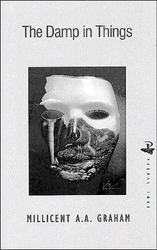
Title: The Damp in Things
Author: Millicent A. A. Graham
Publisher: Peepal Tree Press Ltd
Reviewer: Paul H. Williams
The Damp in Things, the title of this collection of 40 poems, are the last four lines of 'Rainy Days' and it seems to be an apt designation since there is nothing dry about Graham's first book.
The theme of melancholia is replete throughout, but even stronger in 'Rainy Day', which is about longing and regret. Not being allowed to play in the rain did not go down well, perhaps, as Graham says, "Now, regret like ringworm/blue dye and young lime cannot heal/these feet that restrained the heart/and kept me raw from the damp in things."
In 'Gone', she asks, "Where are the children with their arms/bangled from wrist to elbow/a rainbow of elastic bands? ... Lingering, the chalk outline of hopscotch with stones for men ...?" Remember the days when children would collect elastic bands for various reasons and when hopscotch was a popular pastime? Those days are gone and those children have grown now with children of their own, who spend their time in cyberspace. To answer Graham's questions.
The depth of the poems and extensive use of imagery to convey such are the hallmark of this 52-page anthology. The lines border on the spiritual and the surrealistic, which makes them more suited for mature readers who understand the uses and effectiveness of literary devices, since most of the poems cannot be taken at face value. Readers' interpretational skills will be heavily called upon, because the poems are ironic, analogous and metaphoric.
Depth of the poems
Take the opening lines of 'Slingshot in the garden', for example: 'She used to hide herself, sweet/Julie between the green, turning/till ripeness betrayed her/Then he would come/a forked tamarind stick/in his mouth like a tongue/his pocket full of pellets/to sling like lyrics, for/bruising her sun-rouged skin."
Graham also gets personal, revealing issues that are sensitive and topical. Corporal punishment is exposed in, "I am the curve set straight/by a guava switch, the proof/that love can make you flinch/I kiss your palm, though its leaf/is violet on my cheek and the sun/is swelling inside my jaw," from 'I am'.
Colour prejudice jumps out in 'That life'. She writes, "My grandmother taught me I was Black/that unmistakable pitch in her voice told/that my sister's cornmeal skin was sweeter than mine. I measured beauty by the cup of her crackling palm, and whether/it stroked a check to blush or bruises."
The erotic is never excluded from the human psyche, but how much deeper and steamier can it get than in 'Cat'? "How many nights have we distilled/the stars and lapped at their lustre/with the silk of our tongue?/I mull on this, as I trace/the whiskers on your Cheshire face/and snatch the purrs as they surface/from your parted lips with my own."
Well, things get a little more damp in 'The problem with love at first sight', for "you wait in the un-romance for river rocks to pierce your inner thigh/thinking of Moses, staff resting against his leg, the water as it was."
The Damp in Things will moisten the appetite for creativity, and it might even draw some tears. It's reflective, poignant and artful. It moves away from the bawdy, conveying its messages with literary dexterity and sophistication, pulling you into a cocktail of emotions. Think of a moist piece of dark fruit cake; close your eyes and savour the rich taste; and think of The Damp in Things.